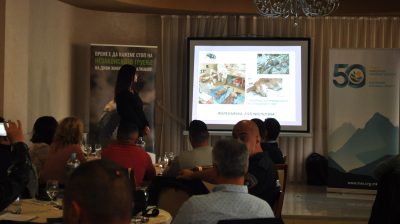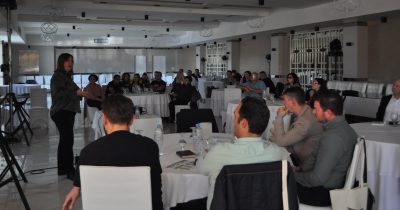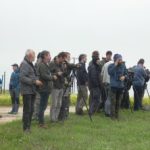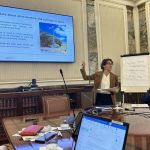On the 6th and 7th of November, the first national trainings were held for investigations of wildlife poisoning cases in North Macedonia. The trainings were intended for the competent institutions that are required to react and investigate such environmental violations or crimes. The first training was held in Kavadarci for the participants from Kavadarci, Veles and Negotino, while the second training the following day was held in Bitola for the participants from Bitola, Prilep and Resen. During the trainings the audience included police officers, state environmental inspectors, state forestry and hunting inspectors, veterinary inspectors and other representatives from the Food and Veterinary Agency, representatives from local hunting societies, representatives from local non-governmental organizations as well as local public prosecutors. A total of eighty individuals were trained on various relevant aspects within this specific investigation.
 The lecturers were a group composed of experts, professors and employees of relevant state institutions – some of which participated in the trainings of the Wildlife Crime Academy.
The lecturers were a group composed of experts, professors and employees of relevant state institutions – some of which participated in the trainings of the Wildlife Crime Academy.
The training started with presentations from MES’s BalkanDetox LIFE coordinator and assistant on the project, the concept of wildlife crime, as well as the consequences of the illegal poisoning of the vulture population in our country.
 After the foundation of the training was provided, the General Inspector for the Environment Darko Blinkov and the Chief Inspector for Nature Protection Pejo Kirovski from the State Inspectorate for the Environment presented the role of their institution, their previous experiences with environmental crimes, the relevant laws and further activities planned concerning this issue. During the training in Bitola, Zoran Dimovski, M.Sc., senior Environmental Inspector, joined their presentation and shared his experience with a case of poisoning of nineteen Griffon vultures in 2007 in the Mariovo village of Zovic.
After the foundation of the training was provided, the General Inspector for the Environment Darko Blinkov and the Chief Inspector for Nature Protection Pejo Kirovski from the State Inspectorate for the Environment presented the role of their institution, their previous experiences with environmental crimes, the relevant laws and further activities planned concerning this issue. During the training in Bitola, Zoran Dimovski, M.Sc., senior Environmental Inspector, joined their presentation and shared his experience with a case of poisoning of nineteen Griffon vultures in 2007 in the Mariovo village of Zovic.
During the presentation “Criminal Investigations in Environmental Crimes,” by Professor Dr. Marina Malish Sazdovska (Faculty of Security – UKLO), the methodology for detecting environmental crime was developed through the application of criminalistic principles, operational-tactical measures and investigative actions. Additionally, a special review was provided to the ways of finding out about the presence of environmental crimes, realization of criminalistic-technical measures and activities, such as: inspection of the scene of the event, situational expertise, collection of material evidence, and more. A special recommendation for improving the efficiency in suppressing this type of crime was given with the establishment of a special department within the Ministry of Interior Affairs. This department will be specialized in detecting, proving and clarifying environmental crimes, including the poisoning of wild birds.
Following the professor, Inspector Goran Mladenovski from the Department of Forensic Examination in the Ministry Interior Affairs held a practical presentation on collecting samples and traces during the crime-scene inspection. Fast, efficient and careful handling in such specific cases is necessary to provide relevant and useful samples, but also to maintain a high level of security for all persons present at the inspection.
When it comes to analyzing and handling the poisoned animals, the veterinary inspector Ljupka Radinska from the Food and Veterinary Agency shared information on correctly identifying a poisoned animal, the different signs of poisoning in mammals and birds, using photos and videos. In addition, Mrs. Radinska explained the competences of the veterinary inspectors when going out for initial field inspection, and further dealing with the corpse depending on whether it is an infectious disease or a poisoning case.
The the last presentation was held by Prof. Dr. Valentina Slavevska – Stamenkovic (Faculty of Natural Sciences and Mathematics – Institute of Biology) on forensic entomology as a useful tool in the pre-investigation and investigation procedure. There are several reasons for the application of forensic entomology such as determining the time of death, whether the corpse was moved from one place to another after death, whether there were additional manipulations of the corpse after death, detection of existing wounds as well as the presence of poisons in the organs.
At the end of the trainings, exercises were held in which a case was presented with a report from a citizen for suspected poisoning of a wild animal and participants were encouraged to have interactive discussions in order to clarify their local standard operational protocols and in which ways they are limited in their capacities (number of employees, equipment, means of transport, knowledge of the subject, geographical maps, financially). The discussions were useful for the further preparation of the Standard Operating Procedure (SOP) for dealing with such cases. Notably, one of the biggest issues raised was which institution has the authority to pick up the poisoned animal and transfer it to the Faculty of Veterinary Medicine for the necessary necropsy and toxicological analyses.
An additional topic that was debated was the very removal of poisoned animals (wild or domestic) from rural areas. Due to the low awareness of competent institutions about the range of threats posed by poisoned carcasses to the surrounding wildlife and public health, ignorance of the terrain in rural areas, difficult physical access to dead animals, and other factors related to the institutions’ capacities, often the carcasses remain not picked up – despite being a source of infectious diseases or secondary poisoning.
As a result, it was determined by the participants that initially the SOP needs to be prepared and legally adopted. The document is being drafted by several members of the National Anti –Poisoning Working Group, with the aim of further proposing it for adoption by the State Environmental Inspectorate. According to the Law on Environmental Inspection, Article 34 states that inspectors, when performing inspection, can use the Standard operating procedures adopted by the Director of the State Environmental Inspectorate.
“The purpose of the SOP is to enable the institutions in charge of combating crime in the wildlife, to carry out procedures by following a certain standardized protocol and the appropriate application and use of administrative and technical aids. These are designed to ensure a high degree of transparency, objectivity and comprehensiveness”, says Darko Blinkov, State Environmental Inspectorate.
Furthermore, the need for more frequent national trainings for the concerned civil servants was highlighted in order to strengthen their theoretical and practical knowledge of dealing with such cases.
Raising awareness among judicial authorities is a key factor in successful criminal investigations. It was extremely important that public prosecutors from Kavadarci, Veles and Bitola were present at the trainings and actively participated in the interactive discussions to share useful information from their line of work. Recently, together with some of the members of the national working group for combating poisons, MES had a meeting with representatives from the Association of Public Prosecutors as a step forward in cooperation in suppressing environmental crimes in our country.
“The concept of the training was excellent, because it consisted of theoretical-empirical presentations by experts and professors in the field, implementation of a practical exercise and a scenario for forensic procedures at the scene of poisoning of wild birds and a discussion with interactive participation of all participants. The result of the training was in many ways useful. Namely, good practices were exchanged in handling, the problems and challenges in handling of these cases in the field were detected and concrete solutions were proposed to improve the procedure cases of poisoning of wild birds. Additionally, the networking of the participants is of particular importance, which is a prerequisite for their future successful cooperation in such situations”, says Prof. Dr. Marina Malish Sazdovska, Faculty of Security – UKLO



